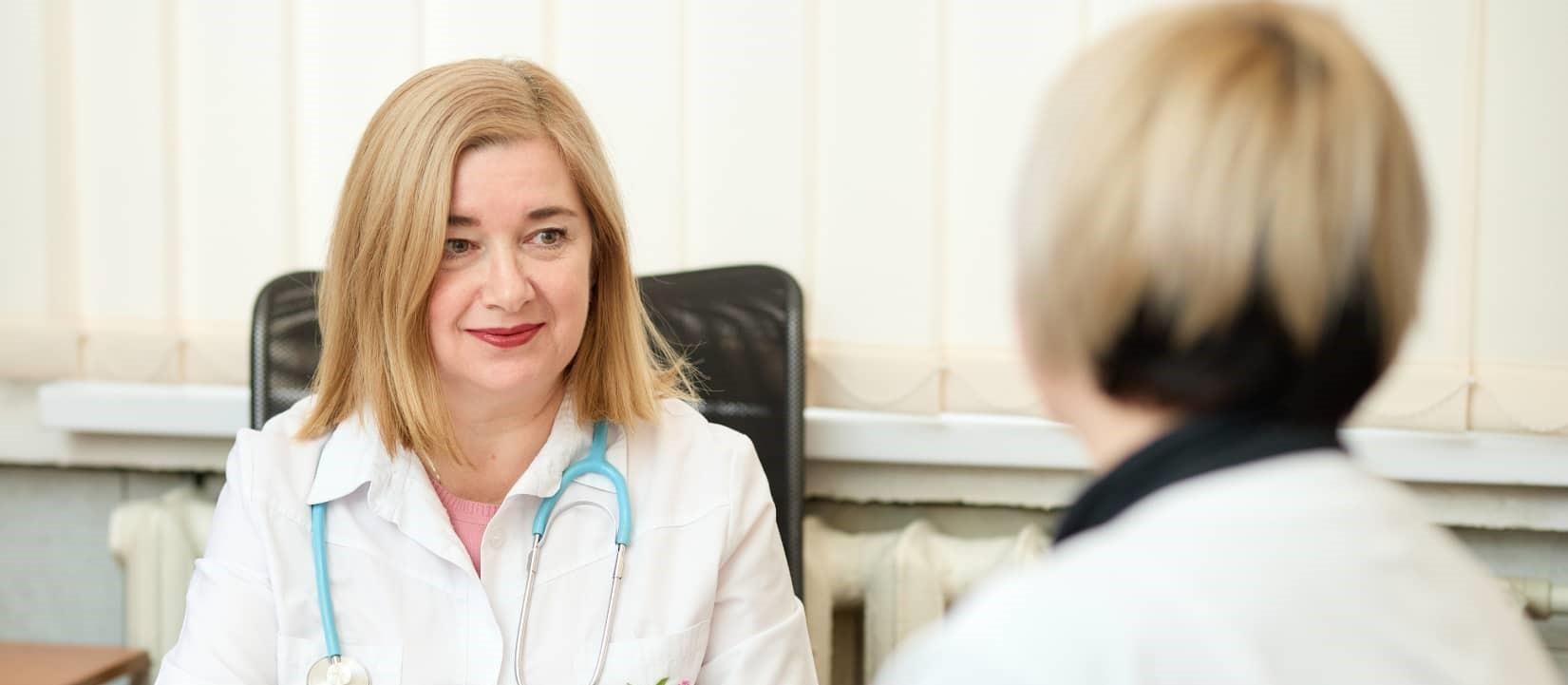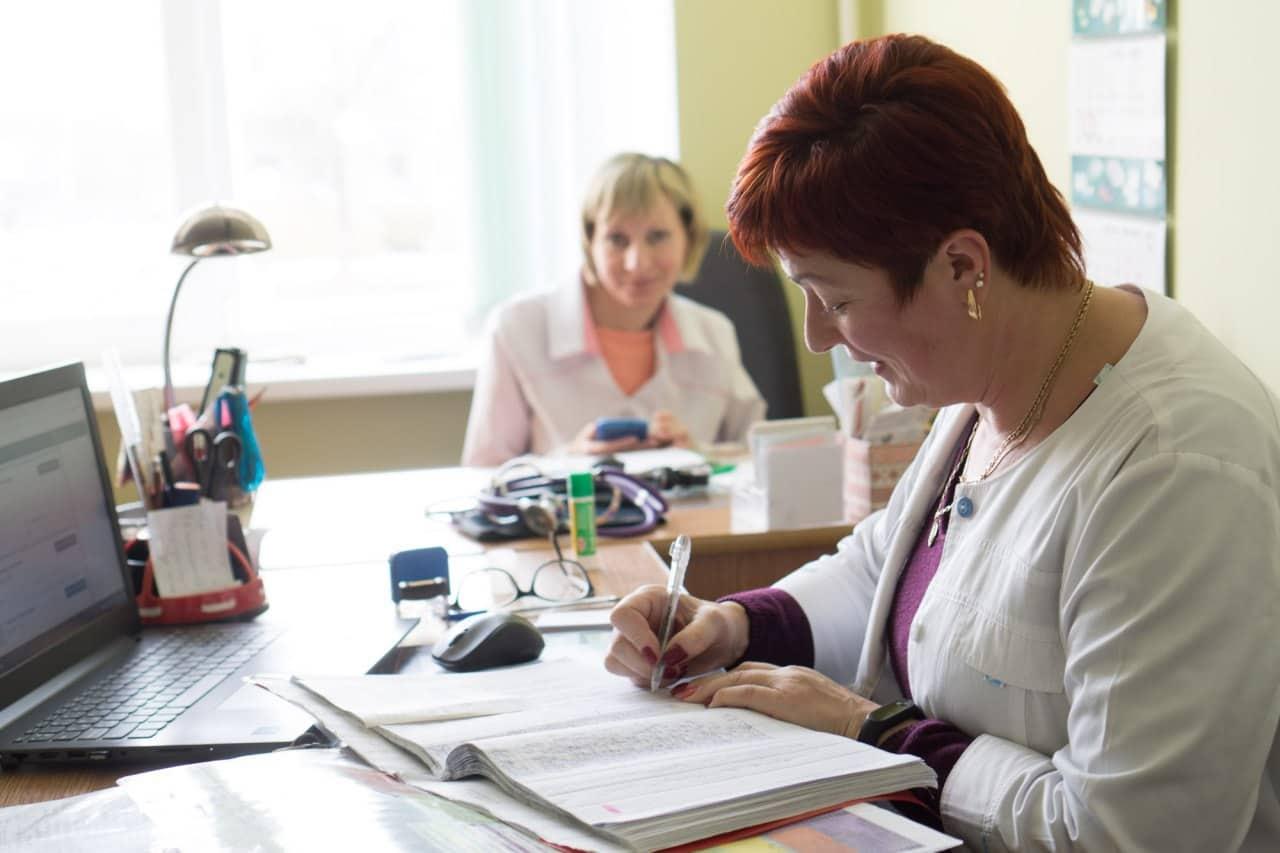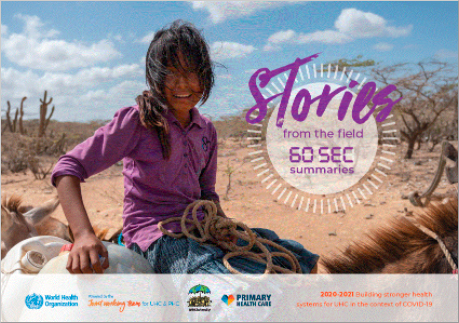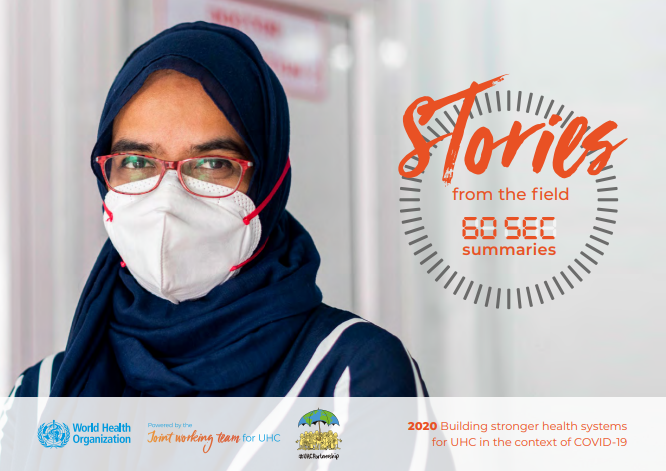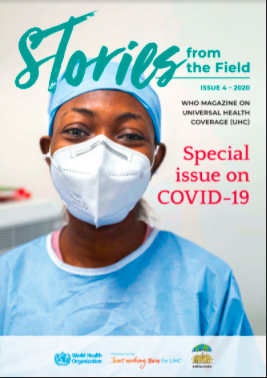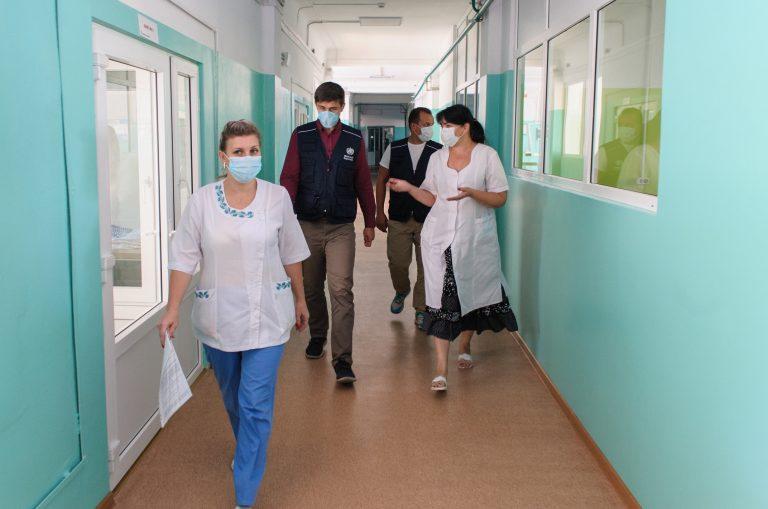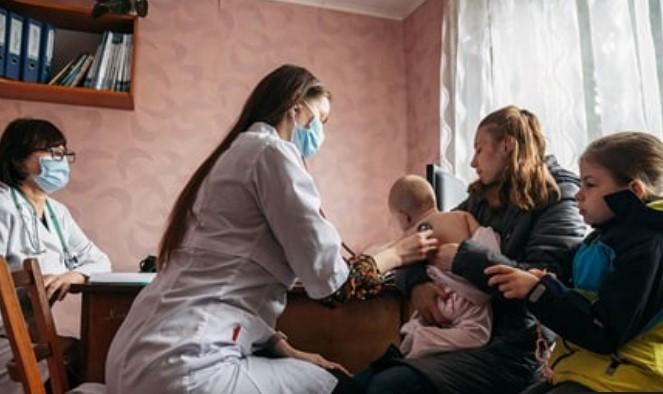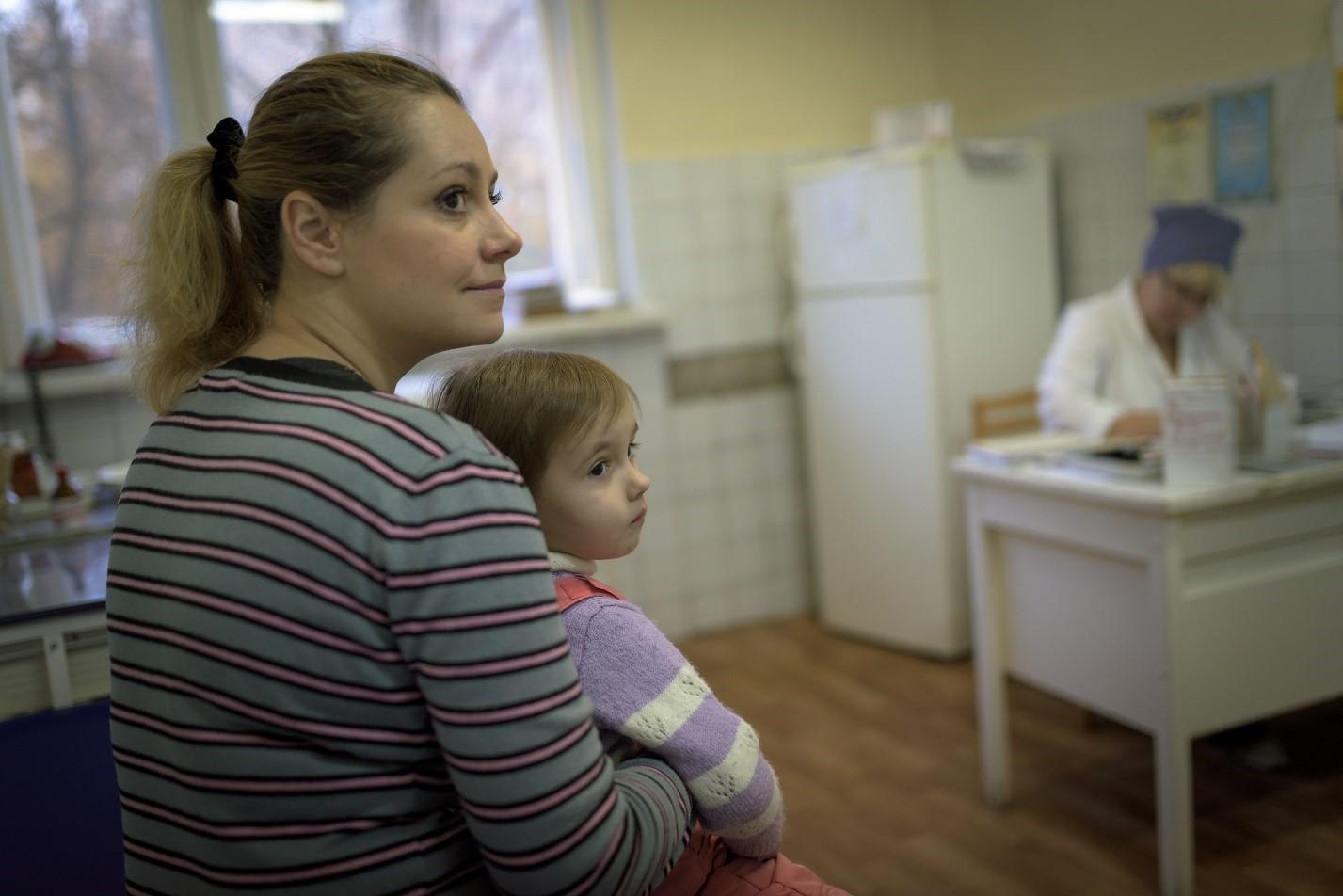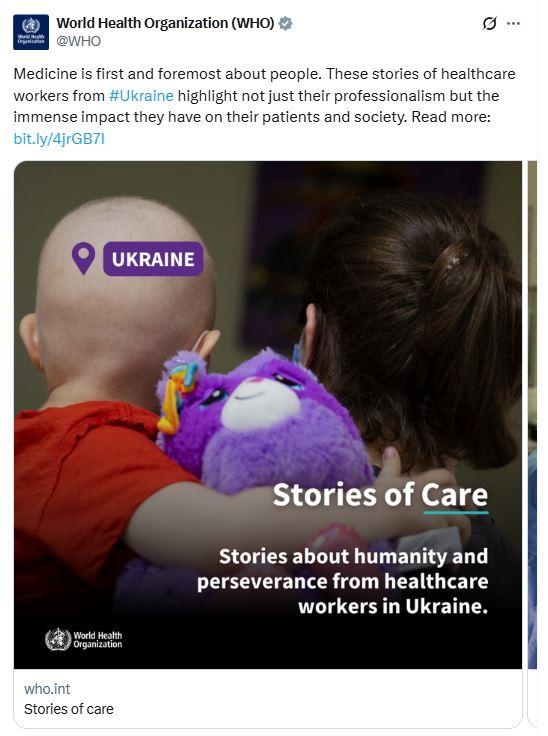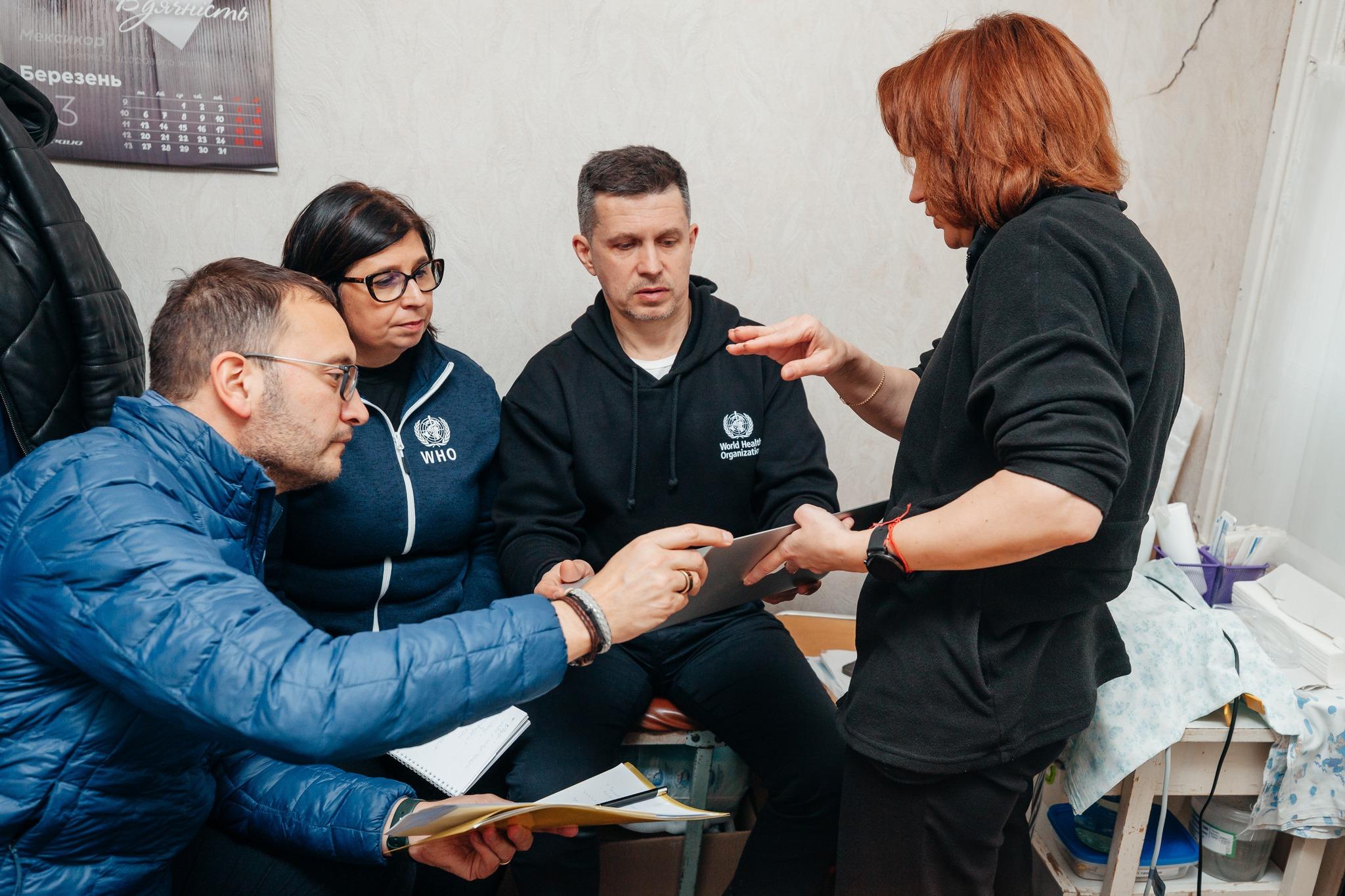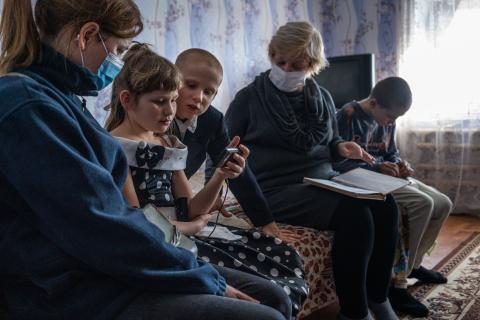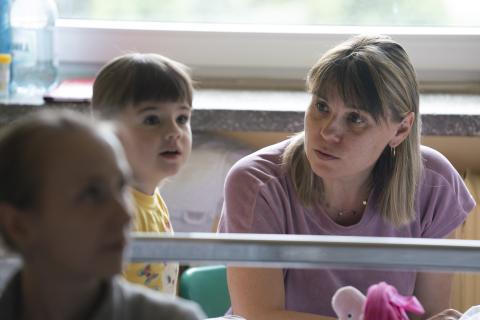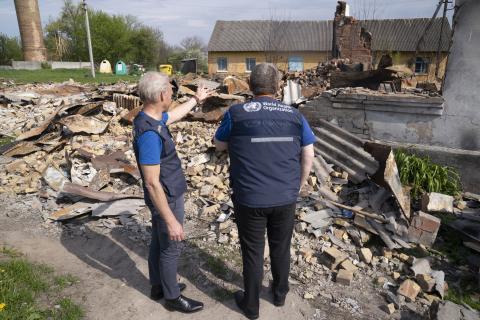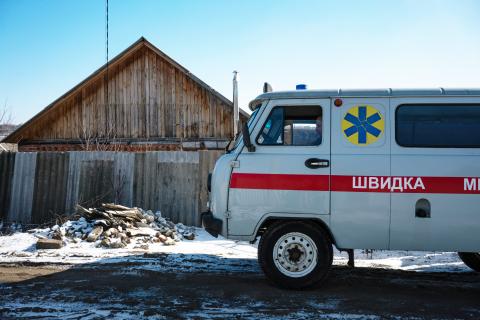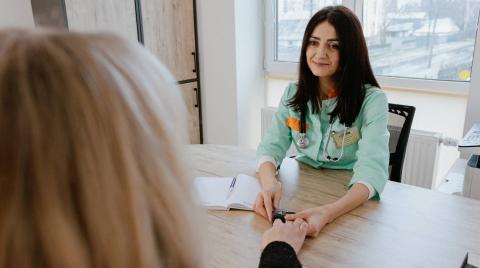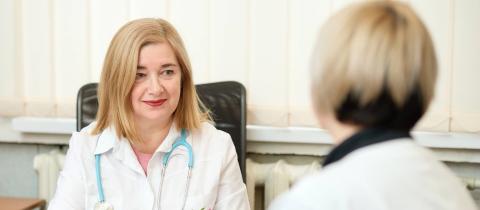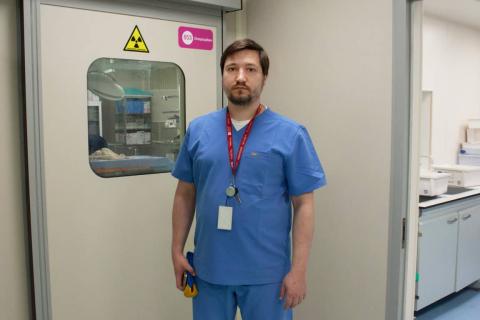Technical Areas
Filter by
Completed/Cancelled activities
Outcome (GPW 13)
Output
Product/Service: Provide support to MOH to promote and advocate UHC through communication that increases engagement, knowledge, support for change, raises awareness and secures a consensus on decision that can drive UHC agenda forward
Technical Area: Governance
Deliverables: Policy briefs and communication materials on UHC
Output
Product/Service: Provide technical support to MOH and NHS to improve the quality of health service delivery, with specific emphasis on strengthening people-centred and integrated primary healthcare towards UHC and SDGs
Technical Area: Service Delivery|Health Financing
Deliverables: 1) “White paper” on service delivery; 2) Policy options on implementing people-centred and integrated health services; 3) Policy dialogue on service delivery; 4) Trainings that contribute to improving skills and knowledge of MOH and NHS staff on service delivery, its governance, accountability and coordination of care
Output
Product/Service: Provide technical advice and support to MOH and NHS on strengthening governance of health financing and strategic purchasing of health services to ensure sustainable delivery of primary healthcare goods and services in line with the defined benefit package to maximize health system performance, advance equity and financial protection
Technical Area: Health Financing|Service Delivery|Governance
Deliverables: Policy advice on governance of health financing, cost-effectiveness, resource planning, incentives and management of spendings for health services.
Output
Product/Service: Contribute to the review of health financing reform for better effective coverage, financial protection, quality health service delivery using a whole-of-systems approach to facilitate Ukraine’s progress towards UHC
Technical Area: Health Financing|Service Delivery
Deliverables: 1) Review report on health financing reform; 2) Joint high-level multi-partners mission; 3) High-level policy dialogue.
Output
Product/Service: Provide technical support to MOH and NHS: 1) to implement and monitor the pilot of purchasing specialized care services in selected oblast; and 2) to prepare oblasts for the introduction of new payment methods to increase access to priority health services and improve the quality and continuum of care
Technical Area: Health Financing|Service Delivery
Deliverables: Analytical note on DRG-based payment system in Poltava oblast and options for the design and implementation of the Hospital Performance Monitoring system in Poltava oblast; 2) Review of health purchasing arrangements for inpatient care contracting; 3) Options to improve the case-by-case payment system for use in other regions of Ukraine from 2020; 4) Requirements for the central component of inpatient care in eHealth, including the development of DRG case grouper; 5) Regulatory framework on the use of the 60/40 approach for financing inpatient care facilities in the regions in 2020; 6) Trainings and workshops that contribute to improving skills and knowledge of MOH and NHS staff on purchasing of specialized healthcare services and provider payment methods.
Output
Product/Service: Provide technical support and capacity building to MOH and NHS to finalize the guaranteed benefit package design to ensure coverage of access to integrated quality primary healthcare services
Technical Area: Service Delivery|Health Financing|Health Workforce
Deliverables: Review of the selection of providers for health care services within the benefit package; 2) Briefs for Ministries of Health, Finance, Economy and NHS on benefit package design, revenue collection, pooling arrangements, and effective purchasing mechanisms; 3) Review of Medical Guarantee Program for 2020-202, including of its technical and legal annexes; 4) Trainings and workshops that contribute to improving skills and knowledge of MOH and NHS staff on benefit package.
Outcome 1.1 (GPW 13)
Output 1.1.1
Product/Service: Support MoH to the organization and delivery of public health services
Technical Area: Service Delivery
Deliverables: Countries will have prepared/developed/updated/adapted their NHPSP through an inclusive policy dialogue process leading to better coverage with essential health services, financial risk protection and health equity
Output 1.1.1
Product/Service: To describe the model and assess the results of Mobile Health Units project
Technical Area: Service Delivery
Deliverables: A report was published on Mobile health units in war-related emergencies in Ukraine to deliver primary healthcare outreach services to address noncommunicable diseases.
Output 1.1.1
Product/Service: Assessment of the impact of the COVID-19 pandemic on the PHC system and the continuity of essential health services
Technical Area: Service Delivery
Deliverables: Surveys on the impact of COVID-19 on PHC were analysed and published in a report entitled "Continuity of essential health services in Ukraine during the COVID-19 pandemic: key findings from two surveys conducted in April and November 2021".
Output 1.1.1
Product/Service: Developing patient centered health services and service delivery across the continuum of care
Technical Area: Service Delivery
Deliverables: Service delivery models developed
Output 1.1.1
Product/Service: Supporting strengthening the public health system
Technical Area: Service Delivery
Deliverables: Improving regulation and practices related to core public health function. Capacity development of the public health service.
Output 1.1.1
Product/Service: Primary health care and priority conditions UHC-PHC
Technical Area: Service Delivery
Deliverables: Under this task, WHO supports a modern multi-disciplinary PHC with a shift away from hospital-centric approaches; specifically, PHC service packages for mental health, CVDs, TB and HIV.
Output 1.1.1
Product/Service: Strengthening primary health care UHC-PHC
Technical Area: Service Delivery
Deliverables: COVID refocused - WHO supports technical guidance and facilitation of the drafting of PHC strategy, assessment of the role and experience of PHC providers in COVID-19, revisiting the role of nurse in PHC and other activities for PHC strengthening.
Output 1.1.1
Product/Service: Provide on-going support for strengthening primary healthcare (PHC) towards UHC and SDGs
Technical Area: Service Delivery
Deliverables: 1) Revised Concept Paper on PHC; 2) Trainings and workshops that contribute to improving skills and knowledge of MOH and NHS staff on integrated people-centered primary healthcare
Output 1.1.1
Product/Service: Strengthening public health capacities.
Technical Area: Service Delivery
Deliverables: Public health system has the capacity to address the burden of diseases and promote health through the life course
Output 1.1.1
Product/Service: Support health service delivery reform by supporting policy development, capacity building of providers, introduction of provider licensing and quality assurance.
Technical Area: Service Delivery
Deliverables: Service delivery reform received required technical guidance, with normative documents on quality assurance and provider licensing drafted
Output 1.1.1
Product/Service: Support the development of National Health Services, including the design and implementation of benefit package and payment mechanisms, performance monitoring of service provision.
Technical Area: Service Delivery
Deliverables: National Health Services of Ukraine has the capacity to implement and monitor the implementation of the benefit packcage and payment mechanisms
Output 1.1.2
Product/Service: Assessment of the PHC system and the continuity of essential health services
Technical Area: Service Delivery
Deliverables: Surveys on the impact of COVID-19 on PHC were analysed and published in a report entitled "Continuity of essential health services in Ukraine during the COVID-19 pandemic: key findings from two surveys conducted in April and November 2021".|WHO conducted the third round of the national wide primary health care health facility assessment in the first quarter of 2023. Over 500 PHC facilities were surveyed, and the results were analysed and published for further dialogue with country authorities.
Output 1.1.4
Product/Service: Strengthen health system governance for improved reform coordination, integrated service delivery; incl. for NCDs, immunisation, communicable diseases and public health and capacity to monitor and evaluate progress toward reform goals and UHC.
Technical Area: Governance
Deliverables: Monitoring and evaluation system for UHC is established, with the identification of process pathways for policy development and decision-making on UHC.
Output 1.1.4
Product/Service: Technical assistance to review the governance options of the NHPA
Technical Area: Governance
Deliverables: Countries receiving HF support will have implemented financing reforms to facilitate UC
Output 1.1.4
Product/Service: Support MOH to prepare options for the governance arrangement of the National Health Purchasing Agency (NHPA) based on international experience and drafts legislation
Technical Area: Governance
Deliverables: Countries receiving HF support will have implemented financing reforms to facilitate UC
Output 1.1.4
Product/Service: WHO-led international expertise and support to MOH/UKR to contribute to strengthening public health system in Ukraine
Technical Area: Governance
Deliverables: Countries will have prepared/developed/updated/adapted their NHPSP through an inclusive policy dialogue process leading to better coverage with essential health services, financial risk protection and health equity
Output 1.1.4
Product/Service: To facilitate the national dialogue on primary health care
Technical Area: Governance
Deliverables: WHO conducted the third round of the national wide primary health care health facility assessment in the first quarter of 2023. Over 500 PHC facilities were surveyed, and the results were analysed and published for further dialogue with country authorities.
Output 1.1.4
Product/Service: Support Ministy of Health (MoH) to implement the Concept Paper “On Public Health System Development in Ukraine”, and to contribute to the development, review and finalization of relevant public health documents
Technical Area: Governance
Deliverables: Countries will have prepared/developed/updated/adapted their NHPSP through an inclusive policy dialogue process leading to better coverage with essential health services, financial risk protection and health equity
Output 1.1.5
Product/Service: WHO-led international expertise and support to MOH/UKR on organization and delivery of public health services and the development of robust public health workforce
Technical Area: Health Workforce
Deliverables: Countries will have prepared/developed/updated/adapted their NHPSP through an inclusive policy dialogue process leading to better coverage with essential health services, financial risk protection and health equity
Outcome 1.2 (GPW 13)
Output 1.2.1
Product/Service: Review Health Financing Concept, contribute to its political discussion, and guide its implementation
Technical Area: Health Financing
Deliverables: Countries requesting health financing (HF) support will have modified their financing strategies and systems to move more rapidly towards universal coverage (UC), with a particular focus on the poor and vulnerable
Output 1.2.1
Product/Service: Technical assistance to the HF Working Group (WG) established by MoH to develop the State Guaranteed Benefit Package to share country examples, agree on benefit design parameters for Ukraine, and guide the WG on calculations of affordability and needed fiscal space
Technical Area: Health Financing
Deliverables: Countries receiving HF support will have implemented financing reforms to facilitate UC
Output 1.2.1
Product/Service: Capacity building of the HF WG and key policy makers in HF to ensure approval and timely implementation of the HF Concept
Technical Area: Health Financing
Deliverables: Accurate, up-to-date evidence on what works and what does not work regarding health financing reforms for universal coverage is available and shared across countries
Output 1.2.1
Product/Service: Primary health care financing to improve access UHC-PHC
Technical Area: Health Financing
Deliverables:
Output 1.2.1
Product/Service: Governance and regulation of health financing system
Technical Area: Health Financing
Deliverables: Work on the benefit package. Financial flows at national and local level. Health financing related analytics and policy briefs.
Output 1.2.1
Product/Service: Support to the health financing institutions and capacity development
Technical Area: Health Financing
Deliverables: Strategic Health Purchasing Arrangements
Output 1.2.1
Product/Service: WHO-led international expertise and support to MOH/UKR to contribute to political and policy discussion, and guide implementation of the Health Financing Concept
Technical Area: Health Financing
Deliverables: Countries requesting health financing (HF) support will have modified their financing strategies and systems to move more rapidly towards universal coverage (UC), with a particular focus on the poor and vulnerable
Output 1.2.1
Product/Service: WHO-led international expertise and support to MOH/UKR to contribute to develop a State Guaranteed Benefit Package in Ukraine
Technical Area: Health Financing
Deliverables: Countries receiving HF support will have implemented financing reforms to facilitate UC
Output 1.2.1
Product/Service: WHO-led capacity building to support MOH/NHPA/UKR in implementation of the Health Financing Concept and strengthening health financing system in Ukraine
Technical Area: Health Financing
Deliverables: Accurate, up-to-date evidence on what works and what does not work regarding health financing reforms for universal coverage is available and shared across countries
Output 1.2.2
Product/Service: Financial protections study
Technical Area: Health Financing
Deliverables: Policy dialog related to financial protections study
Output 1.2.2
Product/Service: Provide technical support on monitoring and strengthening of financial protection to support MOH in developing policies that reduce the number of population experiencing catastrophic and impoverishing health expenditures
Technical Area: Health Financing
Deliverables: Technical brief on the review of the status of financial protection, out-of-pocket payments and catastrophic expenditures.
Outcome 1.3 (GPW 13)
Output
Product/Service: Provide on-going support to MOH to improve access to essential, high-quality and affordable medical technologies and products and strengthen the country’s regulatory capacity
Technical Area: Pharma and Medical Products
Deliverables: Policy advice on pharmaceutical sector governance.
Output 1.3.2
Product/Service: Strengthen policies, organization and capacities of national authorities to procure, finance and provide pharmaceutical products to population, esp. vulnerable groups.
Technical Area: Pharma and Medical Products
Deliverables: National authorities design, implement and monitor policies that provide pharmaceutical products to reduce out of pocket spendings and address the burden and treatment of the most prevalent NCDs in the country.
Activity details
Outcome 1.1 (GPW 13)
Output 1.1.1
Product/Service: 7/9 Supporting service delivery with evidence-based clinical decision-making and improving the quality of care
Technical Area: Service Delivery
Deliverables: PHC monitoring and strengthening the capacity of PHC workers, June 2024 WHO, in collaboration with the Health Department of the Chernivtsi City Council, adapted and implemented a framework of indicators aimed at evaluating the provision of PHC services. Health management specialists gathered and analyzed indicators from PHC providers and discussed the results with them, including the next steps for improvement. To ensure long-term success, the project invested in capacity building for healthcare providers. Twelve training sessions for doctors and nurses were conducted, covering 75% of all PHC staff in Chernivtsi. These training sessions were based on the WHO package of essential NCD interventions and the HEARTS technical package. They focused on integrated, patient-centered care for NCDs, equipping healthcare professionals with cutting-edge skills and knowledge. To assess the outcomes of the pilot project, WHO convened a site visit to Chernivtsi, meeting with representatives of the Chernivtsi City Council, the Health Department of the Chernivtsi City Council, and heads of PHC facilities to discuss the results of the project and further actions. As a significant step towards improving PHC, this initiative is planned to be replicated across other regions in Ukraine.|Enhancing PHC data and performance monitoring, August 2024 WHO provided technical assistance to NHSU and MoH in developing the policy to support the implementation of the PHC monitoring performance framework. The draft policy document is now undergoing the approval process at the Ministry of Health (MOH). To improve the quality of primary health care (PHC) services at the local level in Ukraine, WHO has implemented a pilot project in Chernivtsi. WHO selected this city in western Ukraine as a pilot hromada to introduce a systematic approach to improve access and quality of PHC, with a focus on hypertension care. Consisting of three components, the project aimed at implementing PHC monitoring, improving patient engagement through a communication campaign to raise awareness among the local population about the risk factors and prevention measures of arterial hypertension, and building the capacity of local PHC doctors and nurses. “Cardiovascular diseases, particularly hypertension, are the leading cause of noncommunicable disease (NCD) deaths and one of the main global and national concerns. The ongoing full-scale war in Ukraine has significantly increased the burden of NCDs, especially cardiovascular diseases, among the population. A strong PHC system could help to reduce the burden of arterial hypertension and improve overall health outcomes for the Ukrainian people,” said Dr Jarno Habicht, WHO Representative in Ukraine.|Raising awareness of arterial hypertension, spring 2024 A communication campaign titled “Improving the health of the community through patient engagement” used various methods to reach more than 160,000 Chernivtsi residents over the age of 40, the group most at risk of arterial hypertension. In addition to outdoor advertising and social media messaging, printed materials were distributed in hospitals, and citizens had the opportunity to have their blood pressure measured for free in tents across the city. Over 10,000 people participated directly, with 4,000 filling out questionnaires and entering a draw for blood pressure monitors.|Disseminating the pocketbook of PHC for children and adolescents, January to June 2024 In the first half of 2024, more than 3,000 pocketbooks of Primary Health Care (PHC) for children and adolescents were distributed nationwide to support evidence-based clinical decision-making and improve the quality of care. The pocketbook aims to improve the diagnosis, management, and prevention of common conditions in children and adolescents at the outpatient level. It provides guidance on managing common complaints and conditions and aims to help healthcare providers deliver quality primary health care.|Disseminating the WHO application of Primary Health Care for children and adolescents WHO translated into Ukrainian the WHO application of Primary Health Care for children and adolescents. This APP is for use by doctors, nurses, and other health workers who are responsible for the care of children and adolescents at the primary health care level. It provides guidance on how to manage – and when to refer – children and adolescents presenting with common complaints and conditions. It includes information to enable primary health care providers to coordinate the continued care of children and adolescents with long-term conditions and diseases managed by specialists. Preventive and promotive measures from the newborn period to adolescence include advice on the timing and content of well-child visits, the promotion of early childhood development, and health messages for adolescents.|Noncommunicable diseases: WHO provided technical assistance in developing and implementing national guidelines for hypertension, cervical cancer screening, and alcohol disorder treatment using WHO guidelines, followed by the launch of the PEN (Package of Essential Noncommunicable Disease Interventions) online course of PHC providers National Health Strategy: The National Health Strategy 2030 and its Action Plan were endorsed on 17 January 2025 and adopted by the Cabinet of Ministers. This was a milestone that has been supported by WHO across a number of years, and a major achievement under the current conflict. Nursing: The Framework document for Strategic Directions of Nursing in Ukraine was published on 9 November 2024 aims to contribute to the professional growth of nurses, improvement of the quality of medical services, integration of international standards, and innovations in nursing activity. With the support of WHO, the development of professional standards for nursing has begun for the first time and will continue in 2025.
Output 1.1.1
Product/Service: 6/9 Enhancing capacity in digital health transformation
Technical Area: Information Systems
Deliverables: WHO supported digital health innovation through a series of hackathons and international events, emphasizing digital tools in health service delivery. The 2024 Health Hackathon focused on cardiovascular disease, diabetes, cancer, and mental health, with teams presenting projects to the Harvard Health System Innovation Lab. WHO facilitated international visits for government representatives to attend digital health events, building national capacity for digital health transformation. These initiatives aimed to leverage digital technologies to improve health outcomes, particularly in the context of the war, where traditional service delivery models may be disrupted. As a follow up to the hackathons of 2024, Pre-Acceleration Programme for 11 selected teams was implemented between May-June 2024. The focus on digital health offers the opportunity to modernize the health system and improve access to care, particularly in remote and conflict-affected areas. These initiatives will be essential for tracking progress, identifying lessons learned, and adapting strategies as needed.|Digital Health Innovation: WHO supported digital health innovation through a series of hackathons and international events, with the 2024 Health Hackathon focused innovation in cardiovascular disease, diabetes, cancer, and mental health, with teams presenting projects to the Harvard Health System Innovation Lab.
Output 1.1.4
Product/Service: 8/9 Human resources for health policy and evidence
Technical Area: Health Workforce
Deliverables: Regional roundtables for nursing development across Ukraine, March and April 2024 The first joint WHO-MoH Mission on nursing to learn about the education and work of nurses took place in five regions. The roundtables – held in Cherkasy, Chernihiv, Chernivtsi, Dnipro, Lutsk, Lviv, Odesa, and Vinnytsia – served as a crucial platform for WHO and partners, including representatives of the MoH, local health authorities, nursing associations, and educational and health-care facilities, to come together and discuss the local needs, challenges and ways forward for nursing development in Ukraine. These working meetings aimed to assess the current nursing situation in selected Ukrainian regions, gain some insights into their working conditions and educational and training opportunities, and identify the gaps and challenges to be addressed at the policy level, especially considering the current development of Ukraine’s Nursing Strategy. More than 250 nurses participated in the roundtables, sharing their experiences and contributing ideas for the advancement of the country’s nursing sector.|Monthly workshops for nurses’ empowerment and meaningful nursing engagement, January to August 2024 Through a series of monthly workshops in Kyiv, organized in collaboration with the Centre for Nursing Development, WHO gathered Ukrainian and international nursing experts, primary health care practitioners, rehabilitation specialists, and infection prevention and control (IPC) professionals. Nine dedicated discussions focused on the role of nurses in primary health care and rehabilitation, psychological support for nurses and mental health services, nursing leadership, IPC responsibilities, and educational and capacity-building opportunities for nurses in Ukraine. With the active participation of over 450 nurses, including chief nurses from every region of Ukraine, these workshops helped equip them with new knowledge and skills and expand their horizons by showcasing innovations in nursing practice and education that have taken place both within Ukraine and across the European Region.|Presentation of the preliminary findings of the Health Labour Market Analysis, May 2024 WHO drafted a new Health Labour Market Analysis in Ukraine and presented preliminary findings in May 2024. A mission to focus on Human Resources for Health (HRH) included WHO Regional Office and Country Office experts. Deliberations followed presentations to officials from the Ministry of Health of Ukraine. Subsequent agreements were made to enhance HRH data collection and forecasting efforts, and review nursing and medical education to adhere to EU regulations.|Observatory Summer School on healthcare innovations and transformation in the health workforce crisis, July 2024 This year’s Observatory Summer School took place in July 2024 in Venice, Italy. The topic was navigating the health workforce crisis: health care innovations and transformation. It was co-organized by WHO, the European Observatory on Health Systems and Policies, the Veneto Region of Italy, and the European Commission. The health workforce is a key concern for policymakers, striving to maintain the capacity and improve the performance of their health systems. They are in firefighting mode, with shortages and medical deserts having an increasing impact on access to and quality of services. Countries, including Ukraine, are looking to new models of care and harnessing medical and technological innovations to transform their health systems so that they can respond better to the demographic, social, and environmental realities of Europe. The Summer School successfully addressed critical issues related to the health workforce, providing participants with the knowledge and tools necessary to tackle current challenges and implement effective strategies. By fostering collaboration and sharing best practices, the course aimed to contribute to a more resilient and adaptable healthcare system across Europe.|Human resources for health: WHO published a report titled "Results of initial health labour market analysis in Ukraine" on November 1, 2024. Acting on the recommendations from the analysis, two training sessions were organized in August and September 2024, and the report was officially presented during the event “Nursing: Open Dialogue Between Educators and Practitioners" on 21 November. Additionally, WHO has developed an HRH forecasting tool, for improving HRH data management.
Output 1.1.4
Product/Service: 3/9 Supporting Ukraine's public health leadership
Technical Area: Service Delivery
Deliverables: Empowering public health leaders of tomorrow: new European Public Health Leadership Courses in Ukraine, June 2024 Inspired by the WHO European Programme of Work 2020 - 2025 – "United Action for Better Health in Europe," and the Regional Director's vision of leaving no one behind, the Regional Office for Europe identified the need to support Member States to strengthen their public health leadership capacities. In 2022, the Office on Quality of Care and Patient Safety partnered with the Italian National Institute of Health (ISS) to co-develop the first-ever European Public Health Leadership Course. The course was repeated in 2023 in Bordeaux in collaboration with the University of Bordeaux. |Public Health Workforce and Leadership: WHO CO supported the implementation of the Public Health Leadership Programme (PHLP) in Ukraine (phleaders.com.ua). On 24-28 June 2024, 50 participants of the PHLP from 18 regions of Ukraine participated in the WHO European Public Health Leadership Course in Kyiv. The Course aimed to enhance skills in key public health concepts, strengthen leadership abilities, improve communication and other essential skills, and help them identify innovative approaches to address public health challenges in disruptive times.
Outcome 1.2 (GPW 13)
Output 1.2.1
Product/Service: 5/9 Facilitate the national dialogue on health financing
Technical Area: Health Financing
Deliverables: PHC Financing and Regulatory Changes: WHO's technical support in developing a new methodology for base capitation rate estimation and the subsequent development of the necessary regulatory framework has resulted in a significant advancement in PHC financing, particularly important given the war's impact on population demographics and service utilization. The official adoption of this methodology by the Ministry of Health in July 2024 represents a major step towards establishing a more equitable and transparent funding mechanism for PHC services in Ukraine. This new methodology is designed to ensure fairer reimbursement for PHC providers, promoting greater financial stability within the system and incentivizing the delivery of high quality care, even amidst the challenges posed by the war. The publication of several key reports, including "Results of costing for provider payments in primary Health care in Ukraine," "Impact of the conflict on the costs of primary health care and investments in Ukraine: survey of war effects," and "Time-use survey: summary of the analysis on time use in primary health care facilities in Ukraine, 2023," has provided critical evidence and insights into the financial implications of the war for the Ukrainian health system. These reports offer detailed analyses of PHC costs, the impact of the war on service delivery, and the utilization of resources within PHC facilities. The findings and recommendations presented in these reports have directly informed the development of new financing models in 2024 and strategies to support PHC providers and ensure the continued delivery of essential services, which are facing increased demand and logistical challenges.|PHC costing: WHO's sustained support for three comprehensive costing studies conducted from 2021 to 2024 has yielded significant advancements in PHC financial management, particularly crucial in the context of war-related disruptions and increased health needs. These studies have resulted in the development of a robust PHC cost model and a refined methodology for capitation rate estimation. These tools provide policymakers with granular insights into the cost structures of PHC providers, enabling more informed decision-making regarding resource allocation and provider payment mechanisms. The results of these costing analyses have directly contributed to the formulation of PHC budget estimates for 2024 and 2025, ensuring that budget allocations are grounded in a realistic understanding of service delivery costs, which are likely inflated due to the war. Furthermore, WHO has developed a sophisticated simulation tool that allows policymakers to assess the budget impact of various policy options, facilitating evidence-based policy formulation. Crucially, WHO has also provided targeted training to NHSU staff and PHC providers on the application of the new methodology and tools for budget planning and cost analysis, ensuring that these resources are effectively utilized at all levels of the health system, which may be experiencing staff shortages due to displacement or conscription and increased workload due to the war.|Missions to war-affected regions, May 2024 In May 2024, WHO conducted a mission to five war-affected regions (Odesa, Mykolaiv, Zaporizhzhia, Dnipro, and Poltava) to review the hospital network and capital investment plans in the regions, along with a review of the broader perception of health reforms. The mission, along with a number of online meetings that have followed, provides insights into how the hospital network was developed, the challenges of ensuring that capital investments are aligned with the proposals, as well as specifically better understanding of the challenges in the most war-affected regions, where recovery is not possible, capital investments cannot be planned, but hospitals continue to work and provided needed services, and require additional support to ensure that services remain. WHO Ukraine has a number of initiatives to support local counterparts with strengthening knowledge around health financing. WHO Ukraine translated WHO’s Global Health Financing Policy for the UHC online course into Ukrainian. The course is currently available on the iLearn platform. It will soon be available on the PAHO learning platform as well. The course provides access to Ukrainian-speaking experts to improve their knowledge of health financing principles.|Providing policy recommendations for improved processes, transparency, and accountability of the Programme of Medical Guarantees, May 2024 In 2024, the WHO assessed the PMG cycle and identified three key areas for focus: establishing the NHSU Board, unbundling the PMG processes, and defining the yearly PMG cycle in regulations. Regular meetings have been held with the NHSU to develop a timelier PMG cycle. Discussions with government authorities and a legal review are ongoing to define the responsibilities of the NHSU Board. WHO has prepared a publication, undergoing external review, which describes the current challenges in PMG governance and provides guidance on designing a more timely and transparent PMG development cycle. The report will be published in September 2024, and further discussions with key stakeholders are planned for early September.|Reviewing of the Health Financing Reform in Ukraine, June 2024 In 2017, the Government of Ukraine launched fundamental reforms to the health financing system with the goals of improving access to essential health services for the population and providing enhanced financial protection from excessive out-of-pocket payments. The WHO and the World Bank have been supporting these reforms, including through periodic joint reviews about progress and issues. WHO published a Consultation Draft of the third joint review, “Health Financing in Ukraine: Reform, Resilience, and Recovery,” in June 2024, examining the progress of the implementation of reforms, considering the adaptations and impact of the full-scale invasion of Ukraine by the Russian Federation in 2022. Ukraine's health system and health reforms have demonstrated significant resilience in responding to the challenges brought about by the war. |In July 2024, the WHO Country Office in Ukraine and the World Bank (WB) held regional roundtables in Odesa, Dnipro, and Kyiv as part of finalizing the 3rd review of the health financing reform in Ukraine. The consultation aimed to gather local insights on the implementation of the health financing reform at the regional level amid the ongoing war and to explore ways forward. During consultations with ten regions, WHO and WB experts, along with representatives from the National Health Service of Ukraine (NHSU) interregional departments, Oblast Departments of Health, primary health care and specialized care providers, and health facility owners, discussed topics related to primary and specialized care financing, the implementation of the Affordable Medicines Programme, and the role of the NHSU. The report is being finalized and will be published in September 2024, providing an analysis of the main achievements of the health financing reform despite the ongoing war, identifying challenges, and providing recommendations for further progress.|Health Financing reform review, The third biannual Health Financing Reform Review, conducted in collaboration with the World Bank, “Health financing in Ukraine: reform, resilience and recovery” in November 2024, providing essential insights into the state of Ukraine’s health financing system, examining the progress of the reforms’ implementation and considering the adaptations and impact of the Russian Federation’s full-scale invasion of Ukraine. Regional consultations held with oblast level authorities and providers in July 2024 from 10 oblasts further enriched this process, ensuring recommendations are adapted to the local context.
Output 1.2.1
Product/Service: 4/9 Supporting the development of medical partnerships between Ukrainian and foreign hospitals
Technical Area: Service Delivery
Deliverables: Medical Partnership Is Already Saving Lives in Ukraine and Will Benefit the Whole World, Olena Zelenska, May 2024 In Kyiv, the First Lady of Ukraine, Olena Zelenska, took part in the Conference on International Medical Partnership. The event was also attended by Minister of Health Viktor Liashko, representatives of the German-Ukrainian Medical Partnership Program GIZ, the World Health Organization, the Ministers of Health of Lithuania and Estonia, as well as heads of Ukrainian and foreign hospitals. Medical institutions in Germany, France, Lithuania, Latvia, Israel, Sweden, North Macedonia, Austria, Denmark, Estonia, Spain, Canada, the Netherlands, Poland, Romania, Türkiye, and Moldova have already become twinned with Ukrainian hospitals. From the Ukrainian side, hospitals from Kyiv, Dnipro, Lviv, Rivne, Ivano-Frankivsk, Odesa, Mykolaiv, Vinnytsia, Chernihiv, Ternopil, and Zakarpattia regions joined the partnership. In addition, nine new agreements were signed during the Conference. One of the main highlights of the event was the satellite summit of health ministers from different countries, which launched the international medical partnership program. At that time, 25 Ukrainian hospitals were twinned with hospitals in other countries to share their experience and international practices.|Three-level support to international medical partnerships in Ukraine, June 2024 In June 2024, the WHO Country Office in Ukraine, the Regional Office for Europe, and the headquarters conducted a three-level mission to support the development of an international medical partnership in Ukraine. The initiative was launched by the First Lady of Ukraine, Olena Zelenska, as part of the Summit of First Ladies and Gentlemen and supported by WHO. In September 2023, 25 memoranda were signed between hospitals in Ukraine and healthcare facilities in many countries worldwide. Twenty new partnerships were signed in 2024. This medical partnership involves twinning between specific Ukrainian and foreign hospitals, which directly collaborate depending on each unique situation. The purpose of this WHO mission was to support the Ministry of Health of Ukraine and other national stakeholders in ensuring the sustainability of the international medical partnership program involving healthcare institutions, in line with the priorities identified by Ukraine. This mission reviewed the progress in implementing the medical partnership in Ukraine, developed a vision and parameters for the international medical partnership, and planned further steps to support this initiative.|International Medical Partnerships (IMP) Seminar In November 2024, WHO, together with the Ministry of Health of Ukraine, presented the Vision for International Medical Partnership in Ukraine. This strategic document outlines the key principles and frameworks for implementing international medical partnerships between Ukrainian healthcare institutions and their international counterparts - an initiative launched during the Third Summit of First Ladies and Gentlemen. The event has been communicated through the WHO Ukraine social media channels (link below)
Output 1.2.1
Product/Service: 2/9 To facilitate the national dialogue on PHC financing
Technical Area: Health Financing
Deliverables: WHO and the Ukrainian Ministry of Health unveiled their vision for 2030 in a new Country Cooperation Strategy (CCS) in February 2024 In a significant step towards enhancing public health in Ukraine, WHO and the Government of Ukraine have jointly released the WHO Country Cooperation Strategy, Ukraine 2024 – 2030. The Strategy was published in February 2024 following a joint planning session where the parties also agreed on the key focus areas for 2024. This ambitious plan will focus on health system strengthening and financing, and European Union (EU) accession. It aims to build a resilient, people-centered health system capable of delivering high-quality care to all residents, regardless of their ability to pay, and to navigate the complex health challenges posed by the ongoing war and corresponding public health threats.|Facilitating the national dialogue on primary health care, May 2024 The Second National Primary Health Care Conference in May 2024 in Kyiv aimed to discuss the future direction of primary health care (PHC) development in Ukraine, particularly under conditions of war. Over 500 participants from various organizations gathered to exchange knowledge and map future PHC development priorities. The conference emphasized the importance of PHC in economic and social development and highlighted the need for adequate and equitable funding of PHC. Discussions also focused on challenges faced by health systems, the role of digitalization in enhancing PHC performance, and workforce development. Testimonies from family doctors, nurses, and patients provided valuable insights into PHC services during the war.|High-level meeting on the development of PHC financing action plan, July 2024 WHO supports the Ministry of Health of Ukraine in strengthening primary health care by improving access to comprehensive and affordable PHC services, including essential medicines, and securing adequate funding and priority for the PHC budget as it delivers the best value for money in the health care system. On 4 July 2024, WHO held a high-level working meeting on the development of a primary health care (PHC) financing action plan. The meeting aimed to foster coordination and alignment of priorities among key stakeholders in primary healthcare financing – including the Ministry of Health, the Ministry of Finance, and the National Health Service of Ukraine. WHO experts and representatives from the Ministry of Health, the National Health Service, and the Ministry of Finance discussed priorities for enhancing PHC financing amid the war. They initiated the development of a PHC financing action plan, which will serve as a strategic framework guiding the advancement of PHC financing for the coming years. WHO also presented the situation analysis from the policy paper “Health Care Financing in Ukraine: A Situation Analysis and Policy Considerations,” which focuses on the current state of PHC financing in Ukraine and provides policy recommendations for further strengthening PHC financing.|PHC financing and costing: WHO supported the development of a new methodology for PHC base capitation rate estimation, and the methodology was officially adopted by the Ministry of Health in July 2024, represents a major step towards establishing a more equitable and transparent funding mechanism for PHC services in Ukraine. Several key reports were published regarding financing of PHC in Ukraine, including "Results of costing for provider payments in primary Health care in Ukraine," "Impact of the conflict on the costs of primary health care and investments in Ukraine: survey of war effects," and "Time-use survey: summary of the analysis on time use in primary health care facilities in Ukraine, 2023". The findings and recommendations presented in these reports have directly informed the development of new financing models in 2024 and strategies to support PHC providers and ensure the continued delivery of essential services
Outcome 4.2 (GPW 13)
Output 4.2.1
Product/Service: 9/9 Gender Equality, Health Equity, and Human Rights
Technical Area: Other
Deliverables: Regional Workshop for Health Equity Monitoring, which took place in Kuala Lumpur, Malaysia, June 2024 WHO Ukraine provided learning opportunities to strengthen the capacity of national institutions that develop and implement gender-responsive and inclusive state policy and service provision in the healthcare sector of Ukraine, namely, by arranged participation of the representatives from MoH, PHC, and eHealth in the Regional Workshop for Health Equity Monitoring, which took place in Kuala Lumpur, Malaysia, from 11-14 June 2024. The workshop was called to build the capacity for collection, analysis, and translation of data into action using equity-based measures and WHO-developed tools and instruments and to institutionalize health equity monitoring in national surveillance efforts to reduce health inequities. |Workshop on gender-responsive and inclusive communication for MoH, PHC, NHSU, and Medical Procurement, June 2024 WHO organized a workshop on gender-responsive and inclusive communication on 28 June for 22 representatives of communication departments from MoH, PHC, NHSU, and Medical Procurement to deepen their knowledge of gender concepts and the key principles of gender-responsive and inclusive communications to enable them to apply these principles in their daily work and to equip them with practical skills and tools for implementation of gender-responsive communications and advance gender equality in their outreach interventions.|Training on gender mainstreaming in health programmes and policies for MoH, PHC, and NHSU, July 2024 WHO delivered training on gender mainstreaming in health programmes and policies on 25 July for 27 health managers from MoH, PHC, and NHSU to familiarize them with key gender concepts, extend their understanding of gender as a determinant of health, equip them with skills to conduct gender analysis, apply gender analysis tools in your work and integrate gender issues into programming and develop gender-responsive plans and activities. WHO analyzed the national context, regulatory frameworks, and enabling factors for leveraging mainstreaming of gender equality, reduction of inequalities and human rights violations in health, and has prepared a Conceptual Vision that outlines suggested entry points and directions for improving gender equality, health equity, and inclusivity in policymaking and implementation in the work of the Ministry of Health of Ukraine and the healthcare system in general. The development of this Conceptual Vision is driven by the need to support the healthcare system reform in Ukraine through recovery and development, considering the gender dimension, inclusive and barrier-free access to medical services to meet the urgent diverse needs of women, men, boys, and girls and vulnerable groups of the population of Ukraine and to remove existing barriers to meeting these needs.|Revision of legislative acts WHO provided technical support and expertise in the revision/amending of a range of legislative acts related to gender and human rights: (1) Order No. 278 on the Procedure of conducting and documenting the results of medical examination of domestic violence survivors and providing them with medical assistance to integrate a survivor-centered approach; (2) Order 1041 on medico-biological and socio-psychological indications for changing /correction of sex and its documentation to ensure the fulfillment of intersex people's fundamental right to health based on WHO recommendations and further rolling out ICD-11; (3) the Criminal Code of Ukraine to ensure the full implementation of the Istanbul convention, in particular via introducing the international terms and concepts of "genital mutilation" and following amending the Rules of Forensic Medical Definition severity of injuries.|Revision of online courses on GBV available on the National Health Service of Ukraine Academy Platform To expand access for healthcare and public health professionals to evidence-based and up-to-date educational materials, WHO is revising two online courses on GBV that are available on the National Health Service of Ukraine Academy Platform to ensure alignment with the content, policies, and protocols that are being provided via offline training to the healthcare providers and mitigate any misinterpretations in delivery of services.|Visibility material: the “GBV ruler” on LIVES (Listen, Inquire, Validate, Enhance safety and Support) To improve healthcare workers' communication skills and to raise awareness, WHO developed visibility materials: the “GBV ruler” on LIVES (Listen, Inquire, Validate, Enhance safety and Support) approach for each of the oblasts with the references for available healthcare and other related services, such as social, psychological, legal, etc. The “GBV ruler” with the national-level reference sources of services is available in printed version and is being disseminated among healthcare providers. In addition, WHO is technically supporting MoH with the initiative to develop a governmental roadmap for referrals of GBV survivors on national and sub-national levels to establish pathways and coordination between all state actors engaged in assistance for those who faced and experienced violence.|Gender-Based Violence (GBV) and Gender Equity, fA Conceptual Vision for integrating gender equality, equity, and inclusivity into healthcare policymaking was developed and shared with the MOH. Training sessions and workshops with more than 800 participants in 2024 have strengthened the health system’s response to gender-based violence (GBV) and promoted gender equity in health leadership.
Output 4.2.2
Product/Service: 1/9 Supporting the recovery of Ukraine and the global health agenda on Universal Health Coverage
Technical Area: WHO Leadership
Deliverables: Pushing the agenda for Mental Health, Psychosocial Support, and Rehabilitation at the Ukrainian-German Conference in Berlin, Germany, February 2024 The conference, held in February 2024, was part of the German Platform for Reconstruction in Ukraine, an initiative by the German Federal Government. It aimed at aiding German contributions to Ukrainian reconstruction. The focus was on enhancing the resilience of the Ukrainian health system through mental health and psychosocial support (MHPSS), targeting both healthcare professionals and vulnerable groups like war-affected families and veterans. The aim was to strengthen the mental well-being and resilience of those on the front lines and the affected individuals. WHO contributed to discussions on integrating health systems and building a resilient health framework. Rehabilitation efforts also took center stage, with discussions led by a mix of medical and non-medical experts, including presentations by Ukrainian and German practitioners. The emphasis was on orthopedic technology, showcasing innovations, and leading practices. It served as the foundation for expanding the German-Ukrainian rehabilitation network, facilitated by "BG Kliniken," connecting experts and leading professionals from both countries to share knowledge and enhance physical rehabilitation and trauma care.|Supporting the Ukrainian Global Health Agenda on Universal Health Coverage, February 2024 WHO EURO Regional Office and its European Centre for Primary Health Care hosted a retreat for the Universal Health Coverage Partnership (UHC Partnership) countries on 27 and 28 February in Almaty, Kazakhstan. The event gathered 60 WHO colleagues to strategize for greater impact in the nine countries: Armenia, Azerbaijan, Georgia, Kyrgyzstan, North Macedonia, the Republic of Moldova, Tajikistan, Ukraine, and Uzbekistan. Participants included WHO representatives, health policy advisers, national programme officers, and WHO EURO Regional Office colleagues. Together, they focused on key technical priorities such as primary health care (PHC), the health workforce, and health financing. The retreat provided a platform to exchange experiences, foster cross-country learning, and strategize on collaboration for impact. The WHO European Centre for PHC also launched Season 4 of the “Let’s Talk PHC” talk show. The discussion centered on the role of trust in PHC transformation, drawing insights from the Tallinn Charter 15th Anniversary Health Systems Conference to inspire innovative approaches.|Moving the discussion forward for health as a prerequisite for recovery at the Ukraine Recovery Conference in Berlin, Germany, June 2024 The URC2024, held in June 2024, was a continuation of the annual series of high-level political events dedicated to the swift recovery and long-term reconstruction of Ukraine since the beginning of Russia’s full-scale war of aggression against Ukraine. Governments, international organizations, financial institutions, businesses, regions, municipalities, and civil society came together – united by a shared commitment to strengthen the resilience of Ukraine for as long as needed. With over 3,400 participants representing the various stakeholder groups, they demonstrated our strong engagement for Ukraine’s future at the URC2024. A panel discussion on Health as a Prerequisite for Recovery, facilitated by WHO Representative in Ukraine, Dr. Jarno Habicht, allowed to focus on the importance of a modern, inclusive, and resilient healthcare system as a prerequisite for reconstruction and recovery and discuss solutions for a human-centered recovery and strengthened the resilience of Ukrainians through support in such areas as mental health, rehabilitation, and eHealth.|Supporting the Ukraine Health System Recovery Office, 2024 WHO provides regular support to the Ministry of Health project office on Health System Recovery and Reform, which was established to support MOH with the implementation of activities in the areas of health system reform and post-war recovery. WHO is supporting the project office with capacity building, establishing a dialogue with relevant international stakeholders, and obtaining and analyzing related health data and analytics, which allows it to understand the health sector needs better, identify priorities, and coordinate ongoing activities on the ground. The Recovery Office also serves as Secretariat to the ITA coordination structure, Sectoral Working Group “Health,” where WHO serves as a co-chair and additionally provides guidance to the Recovery Office on maintaining regular dialogue with international stakeholders, communicating needs, priorities, and results of health reforms, emergency response, and health sector recovery. Ongoing WHO contact with the Recovery Office allows for more effective coordination with partners on joint directions and priorities of the health system of the country.|Amplifying the voices from the frontline, June 2024 WHO launched in June 2024 a publication titled "Voices from the Front Line: perspectives on Health System Response and Recovery in the War-affected Areas of Ukraine." It provides a comprehensive look at the challenges faced by the health system in Ukraine amid the ongoing conflict. It highlights the resilience and efforts of local communities, regional and local governments, health facilities, clinicians, and community representatives, particularly in areas close to the front line. The report underscores the importance of sustained international support for reform, recovery, and reconstruction in Ukraine, emphasizing health as a key determinant of human capital, economic growth, and social cohesion.|Milestones and key achievements in UHC 1. The National Health Strategy 2030 and its Action Plan endorsed and adopted by the Cabinet of Ministers. 2. WHO and the World Bank, under WHO lead, prepared and launched the 3rd biannual Health Financing Reform Review, “Health financing in Ukraine: reform, resilience and recovery” 3. The new methodology for PHC base capitation rate estimation was officially adopted by the Ministry of Health. 4. The second national PHC conference was held in Kyiv aiming to bring all stakeholders to envision the evolution of PHC under wartime conditions. 5. Results of initial health labour market analysis in Ukraine was published providing comprehensive analysis of the health workforce situation in Ukraine. 6. Public Health Leadership Programme (PHLP) in Ukraine was initiated To mark the Universal Health Coverage Day on 12 December 2024, the WHO Ukraine team together with the Ministry of Health of Ukraine and the WHO Barcelona Office for Health Systems Financing joined the UHC Partnership Global Meeting in Lyon. Extensive communications coverage has been ensured across WHO Ukraine social media channels to communicate about a special session on financial protection within the global event, where participants discussed key findings from the WHO/Europe report on financial protection and Ukraine’s progress towards UHC amid the war. On the Universal Health Coverage Day, WHO Ukraine has launched a nation-wide communication campaign, which featured a series of portraits and stories of health professionals from across Ukraine with a purpose to draw attention to their achievements as well as the challenges they face amid the war and beyond. The communications campaign included: • Development of 12 stories in English and Ukrainian with Ukrainian healthcare workers, published on the campaign website (link added below) • Organization of an exhibition in a shopping center in Kyiv • Promotion of stories through the social media.



